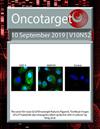探索 GHRH 拮抗剂 MIA-602 在克服急性髓性白血病中多柔比星耐药性方面的作用
Q2 Medicine
引用次数: 0
摘要
急性髓性白血病(AML)的特点是骨髓中突变的造血祖细胞迅速增殖。传统疗法包括化疗和骨髓干细胞移植,但这些疗法往往预后不佳。值得注意的是,生长激素释放激素(GHRH)受体拮抗剂MIA-602已被证明能阻碍包括急性髓细胞性白血病在内的多种人类癌细胞系的生长。这项研究考察了 MIA-602 作为单一疗法以及与多柔比星联用对三种多柔比星耐药急性髓细胞系(KG-1A、U-937 和 K-562)的影响。体外实验结果显示,所有经处理的野生型细胞的存活率都显著降低。多柔比星耐药克隆对 MIA-602 的敏感性与野生型相似。我们用对多柔比星耐药的 K-562 异种移植裸鼠进行的体内实验显示,与对照组相比,MIA-602 治疗后肿瘤体积缩小。我们的研究表明,这三种急性髓细胞系及其多柔比星耐药克隆对 GHRH 拮抗剂 MIA-602 易感。本文章由计算机程序翻译,如有差异,请以英文原文为准。
Exploring the role of GHRH antagonist MIA-602 in overcoming Doxorubicin-resistance in acute myeloid leukemia
Acute myeloid leukemia (AML) is characterized by the rapid proliferation of mutagenic hematopoietic progenitors in the bone marrow. Conventional therapies include chemotherapy and bone marrow stem cell transplantation; however, they are often associated with poor prognosis. Notably, growth hormone-releasing hormone (GHRH) receptor antagonist MIA-602 has been shown to impede the growth of various human cancer cell lines, including AML. This investigation examined the impact of MIA-602 as monotherapy and in combination with Doxorubicin on three Doxorubicin-resistant AML cell lines, KG-1A, U-937, and K-562. The in vitro results revealed a significant reduction in cell viability for all treated wild-type cells. Doxorubicin-resistant clones were similarly susceptible to MIA-602 as the wild-type counterpart. Our in vivo experiment of xenografted nude mice with Doxorubicin-resistant K-562 revealed a reduction in tumor volume with MIA-602 treatment compared to control. Our study demonstrates that these three AML cell lines, and their Doxorubicin-resistant clones, are susceptible to GHRH antagonist MIA-602.
求助全文
通过发布文献求助,成功后即可免费获取论文全文。
去求助
来源期刊

Oncotarget
Oncogenes-CELL BIOLOGY
CiteScore
6.60
自引率
0.00%
发文量
129
审稿时长
1.5 months
期刊介绍:
Information not localized
 求助内容:
求助内容: 应助结果提醒方式:
应助结果提醒方式:


